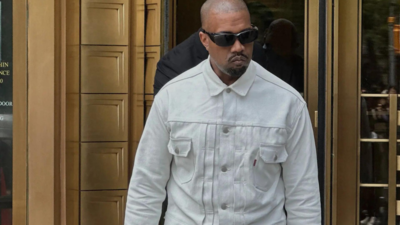Kanye to headline Slovakia festival despite pro-Hitler song

“Hip-hop visionary, cultural icon and controversial genius YE will perform July 20, 2025 exclusively at the Rubicon Festival in Bratislava. It will be his only confirmed live performance in Europe in 2025 — and ever first show in Slovakia in history,” organizers confirmed on the event’s website on Monday. “Rubicon Festival is raising the bar for European festivals to a whole new level.”His participation in the festival has sparked anger. More than 3,000 people have already signed a petition asking the festival to cancel the performance of the rapper, who is formerly known as Kanye West.The authors of the petition point out that Ye has in recent years repeatedly and openly adopted the symbolism and ideology associated with Nazi Germany, having written, for example, “I am a Nazi” and “I love Hitler” on social media platforms.“He trivializes the crimes of the totalitarian dictatorial regime and the war atrocities that also affected the Slovak population,” the petition reads.The petition refers to Ye’s latest track, “Heil Hitler,” which was released on May 8 — the 80th anniversary of the defeat of Nazi Germany in World War II.The song references the Nazi salute which was used while Adolf Hitler was in power. The single’s artwork resembles a swastika, and the song ends with a lengthy sample from a Hitler speech.As the petition also mentions, the song is banned in Germany.
Nazi symbols prohibited in Germany
Within Germany, Ye’s video cannot be seen among his posts on X, the social media platform formerly known as Twitter. Changing one’s location to the United States with a VPN makes the post visible.“Heil Hitler” was used as an official greeting in Nazi Germany. The accompanying arm movement, which is made with the right arm extended and the palm facing down, is said to have its origins in ancient Rome and was then adopted by Italy’s fascist dictator, Benito Mussolini, in the 1920s.Later, Hitler made it a signature of the Nazi Party, which ruled Germany from 1933 until 1945.In the postwar era, West German authorities banned the use of many Nazi symbols and gestures as the country emerged from the Holocaust, which claimed millions of victims throughout Europe.The public display or dissemination of Nazi symbols and slogans such as the arm gesture or the phrase became a criminal offense under Section 86a of the German criminal code.This law prohibits the use of symbols associated with “unconstitutional organizations,” including those affiliated with the party, such the swastika, SS runes and the Nazi salute and slogans.Using such symbols or gestures can be punished with up to three years in prison or a fine.Denying the Holocaust is also illegal in Germany and many other European countries, as well as in Canada and Israel.Eighty years after the end of the war, the ban on Nazi-related content remains strict
Nazi symbols not banned in the US
To counter the rise of far-right groups and growing antisemitism, other countries have also banned hate symbols — some quite recently. In February, Australia passed a law against hate crimes that includes minimum sentences for displaying hate symbols, including the Nazi salute.In the United States, many forms of hate speech are protected by the US Constitution’s First Amendment, which is meant to guarantee free expression.It is not illegal to perform a Nazi salute or wear a swastika in the United States.Since World War II, the salute has often been used by neo-Nazis and white nationalists. In 2016, for example, a shocking video showed a white supremacist group supporting Donald Trump’s 2016 presidential win by raising their arms in an apparent Nazi-style salute.In January, X owner Elon Musk, who openly supports the nationalist Alternative for Germany party, came under scrutiny for performing what looked like a Nazi-style salute at Trump’s second inauguration. Musk’s defenders claimed it was accidental; many observers saw it as intentional.In response, activists from campaign group Led by Donkeys projected an image on his Tesla factory just outside of Berlin showing Musk doing the gesture, with the title appearing as “Heil Tesla.” The group felt that if the German authorities considered the symbol to be illegal according to the country’s criminal code, it would prove that Musk had performed the Nazi salute.Musk has come under fire for expressing antisemitic views in recent years, including responding to a user on X in 2023 who accused Jewish communities of “pushing … dialectical hatred against whites,” a conspiracy theory popular among white supremacists.“You have said the actual truth,” Musk tweeted in a reply to the user.
Lack of tech company regulation
Though platforms including Spotify, YouTube and Soundcloud worked to ban Ye’s single quickly after its release because of its antisemitic content, the video was widely available on X. Even though Ye has been suspended multiple times from Twitter and now X for antisemitic content, his account has always been restored.Ye’s celebrity status also led fans to share the video on Facebook, Instagram and Reddit, among other platforms, millions of times. It shows just how little power big tech companies seem to have — or want to put into removing offensive content once it has already been published. The video and the scramble to remove it have caused a renewed look at the content policies of major tech companies, particularly the social media platforms owned by Meta.In light of the video, the Anti-Defamation League, a US-based, international nongovernmental organization that combats antisemitism, bigotry and discrimination, started a petition asking Facebook and Instagram to “reinstate guidelines meant to protect users from disinformation and hate” on Facebook and Instagram.Meta announced in January that it would no longer employ fact checkers, and loosened rules around hate speech and abuse in light of “recent elections” — a reference to Trump’s presidential win.Yet the pro-Hitler rhetoric spouted by Ye’s latest single still falls under the company’s rule of prohibiting “harmful stereotypes historically linked to intimidation, including Blackface and Holocaust denial.”








